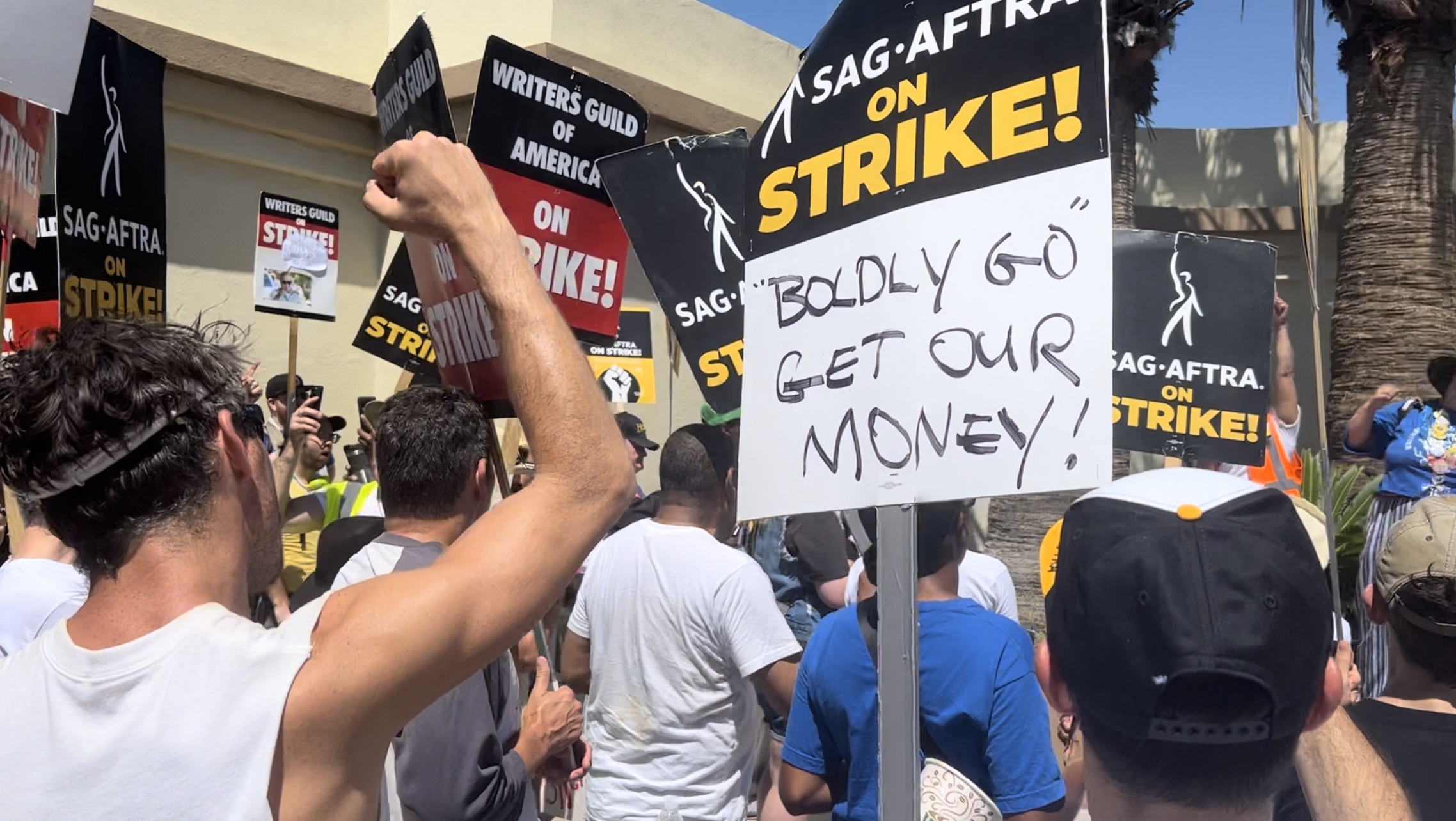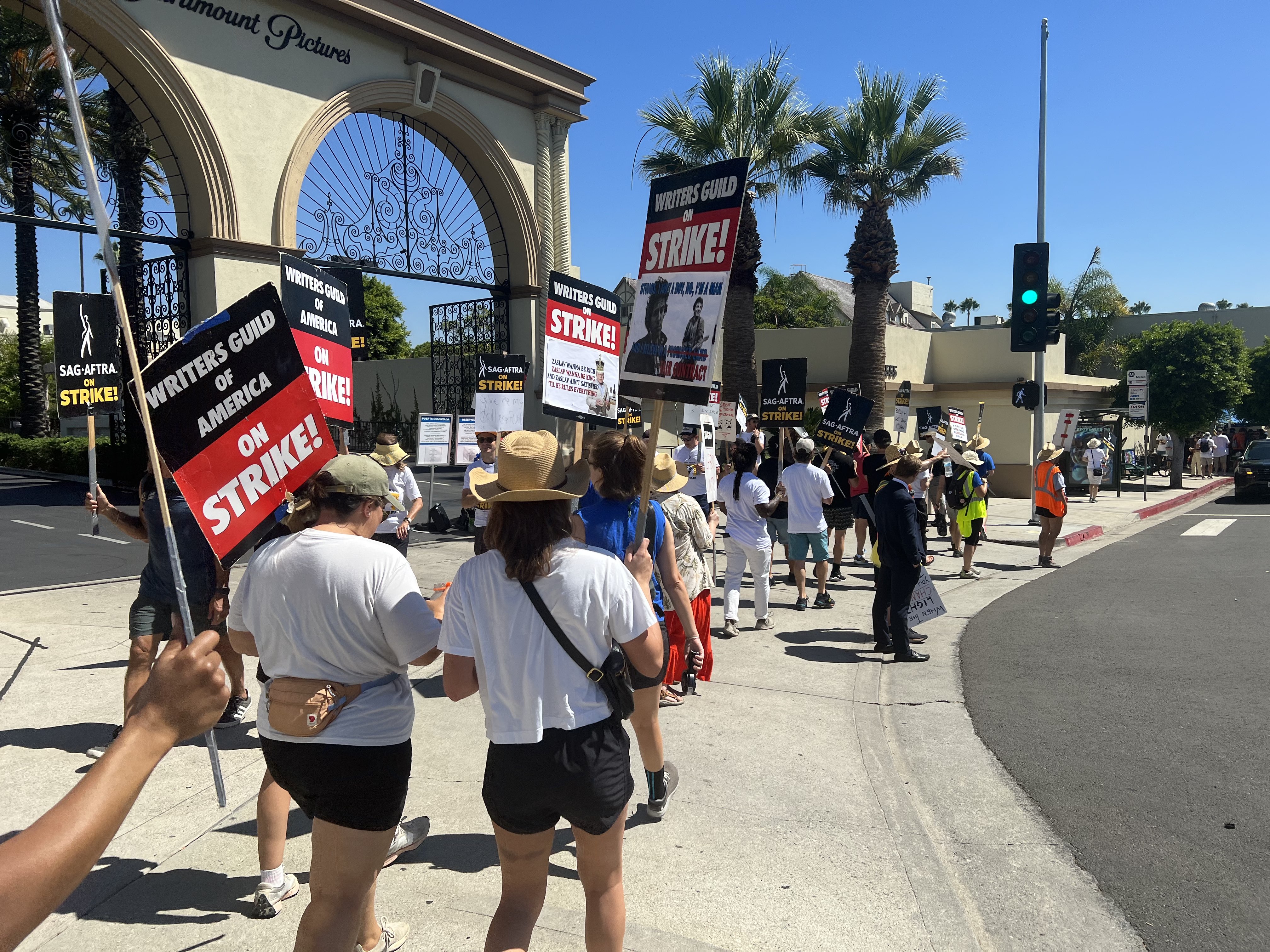
HOLLYWOOD, Calif. -- Saturday will mark four full months, the day Hollywood’s writers officially went on strike against the Alliance of Motion Picture and Television Producers (AMPTP). And outside Paramount Studios, tempers run just as hot as the 93-degree late-August weather.
The Writers Guild of America strike that began on May 2 also marked the union's first work stoppage since 2007, when a three-month strike cost motion picture and television industries an estimated $2.1 billion in output. A film set can generate hundreds of thousands of dollars every day, said Kevin Klowden, chief strategist with the Milken Institute, putting potential losses for this four-month strike at well over $1 billoin.
But the WGA strike, along with SAG/AFTRA's current work stoppage, which began in mid-July, likely won’t be ending anytime soon, as the frustration on the front line is palpable. With signs that read “Disrupt This” (accompanied by an illustration of a middle-finger), “All I see is corporate greed,” “Show me the money,” “Zaslav wanna be rich, Zaslav wanna be king," writers and actors alike filled the crosswalks outside Paramount and other studios once again Tuesday.

“There is physical fatigue. It's hard to walk all day in the heat” said Haley Harris, a writer and WGA coordinator who’s been involved in negotiations since November.
“But emotionally, there hasn't been any fading. Everybody is still very mad, and rightfully so — it’s like training for a marathon. We knew what we were getting into.”
Just last week, the AMPTP offered a revised contract to the WGA, which the guild called “neither nothing, nor nearly enough.” Both have since seemingly left the table.
Also read: The WGA Strike Thaws? Writers and Studios Set to Meet for a Fourth Consecutive Day
“There was a little bit of optimism because there hadn’t been talks for 102 days and we knew our leadership negotiating committees would only engage in talks if it seemed like the AMPTP was serious,” added Harris. "It turns out they weren’t.”
“They put out a statement in hopes that it would split our membership up and divide us,” said Colleen Klinefelter, another picketing writer whose credits include Grown-ish. “And we didn’t do that because we know what a bad contract looks like.”
WGA demands include more equitable profit distribution, industry adaptation to rising prices, proper residual payments and protection against the use of artificial intelligence.
“We’re watching the studios choose to implode in real time rather than be remotely transparent about their viewership numbers,” Klinefelter said. “And it’s become increasingly frustrating to see what they would rather give up than their numbers.”
Perhaps the most critical issue in conflict is the way in which residual payments will be handled, considering the dominance of streaming services in the entertainment industry. Harris, who is also a published screenwriter, believes that the guild’s demands are not unreasonable.
“I’ve worked for Netflix, and I’ve worked for HBO, but I just got my first residual check from Lifetime," she said. "Nobody is saying that Lifetime makes as much money as Netflix, but this business model works, and it has worked.”
Shows like Abbott Elementary, for example, air on ABC (a traditional television network) and are also streamed on Disney-controlled subscription service Hulu. While writers would take a significant portion of revenue in residuals for reruns on the ABC network, payouts for streaming under the current AMPTP contract are far smaller.
“They told us that they don’t have the money, and they’ve proven to us in four months that they do have the money -- because they’re willing to lose it,” Klinefelter said.
“It’s hard, don’t get me wrong. There are some days where I don’t want to get up and go, but seeing that our solidarity has improved — that’s why I think we’re going to win," she added.







